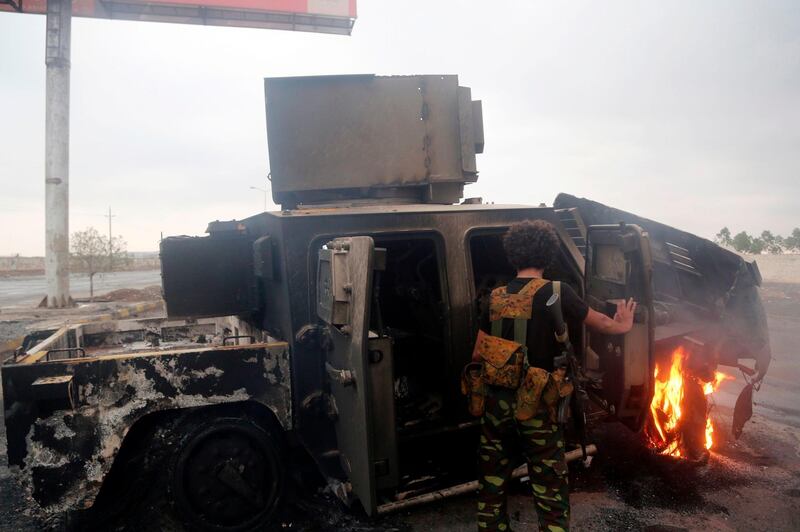A UN-brokered ceasefire for Yemen's Hodeidah governorate will go into effect at midnight on Tuesday, a UN source told The National, as clashes between rebels and the government continued in the area.
The UN source who spoke on the condition of anonymity said that the ceasefire deal was originally supposed to go into effect as soon as it was announced last Thursday but noted that implementation will take more time.
A Yemeni official also confirmed to The National that the ceasefire will go into effect on Tuesday night.
The delay in implementing the cessation of hostilities comes amid renewed clashes on the outskirts of Hodeidah city on Sunday-- the third round of fighting between warring parties since the ceasefire deal was first announced.
Houthi rebels on Sunday launched an attack on positions controlled by the pro-government Al Amalikah brigades in the Al Tahita district, south of Hodeidah, a member of the Al Amalikhah force told The National.
He said clashes lasted for more than three hours before pro-government fighters pushed rebels back.
Earlier on Saturday night, fighting erupted in the districts of Al Durayhimi, Al Heiss and Al Tahita, the deputy governor of Hodeidah, Walid Al Qudaimi said.
A commander with pro-government forces, Mohamed Al Houmaidi, told The National that a number of Houthi rebels were killed in clashes near the Al Hulaika market. He did not specify how many.
He also said that pro-government forces foiled an attempt by rebels to break a siege imposed by pro-government forces on the Al Durayhimi district, south of Hodeidah.
The district, widely regarded as one of the gateways to Hodeidah, was cleared of rebels in August.
He said that clashes first started on Friday night, only one day after the Hodeidah deal was announced.
A pro-government military source told AFP that at least 29 fighters, including 22 Houthi rebels, were killed on Saturday night in clashes and air strikes in Hodeidah province.
_______________
Read more:
[ Hodeidah ceasefire monitoring urgently needed, says UN envoy ]
What we know about the Hodeidah ceasefire
[ UAE welcomes breakthrough in Yemen peace talks ]
A lonely fight for Yemen’s only female delegate to UN-backed talks
_______________
A spokesman for pro-government forces in Hodeidah also posted a video on Twitter purporting to show Houthi rebels planting explosive devices on the outskirts of the 7 July neighbourhood in Hodeidah city on Saturday. The National could not independently verify the authenticity of the footage.
#صور هذا المشهد في تاريخ 15_12_2018م يوم #السبت.#شاهدوا الفيديو احد افراد مليشيات الموت والإرهاب يقوم بزرع حقل من العبوات ناسفة في #أطراف حي #سبعة يوليو. الحديدة. #تهيب #القيادة العامة للوية العمالقة والقوات المساندة له، بأنه #لن #تتهاون #إزاء ما تقومhttps://t.co/zFFUeKjvYL pic.twitter.com/Kv3p9lEIt0
— وضاح الدبيش ابو مهند (@wadahdobish) December 15, 2018
In comments to the Al Bayan newspaper, the deputy governor of Hodeidah also accused rebels of continuing to kidnap civilians suspected of co-operating with the government. He said that Houthis kidnapped a lawyer and two of his security guards in Hodeidah's 7 July neighbourhood, despite a prisoner exchange agreement brokered between the two sides in Sweden last week.
In comments to The National, Mr Al Qudaimi accused rebels of looting vehicles and goods from the port of Hodiedah and transferring them to the rebel-held cities of Sanaa and Sadaa.
The deputy governor said Houthis looted 1,500 cars and 4,000 containers of goods from the port in the last couple of days, before their anticipated withdrawal from Hodeidah.
"All the goods and the cars looted by the Houthis are owned by traders from different provinces, they were supposed to be handed over to them but all the vehicles and the goods were looted by the rebels before the UN takes control over the port," Al Qudaimi said.
He also accused rebels of stealing official documents from state-run institutions in Hodeidah, including rosters that list the names of public employees.
Rebels have also issued orders to their fighters to disguise themselves in the uniforms of government security forces, in an attempt to feign compliance with the terms of the ceasefire deal, Mr Al Qudaimi said.
The Hodeidah ceasefire deal was announced on Thursday at the end of a week of negotiations in Sweden, the first talks between the two sides since 2016.
The agreement called for an immediate cessation of hostilities across Hodediah governorate and called on all armed forces to withdraw from the port city and its key harbours as part of the deal.





